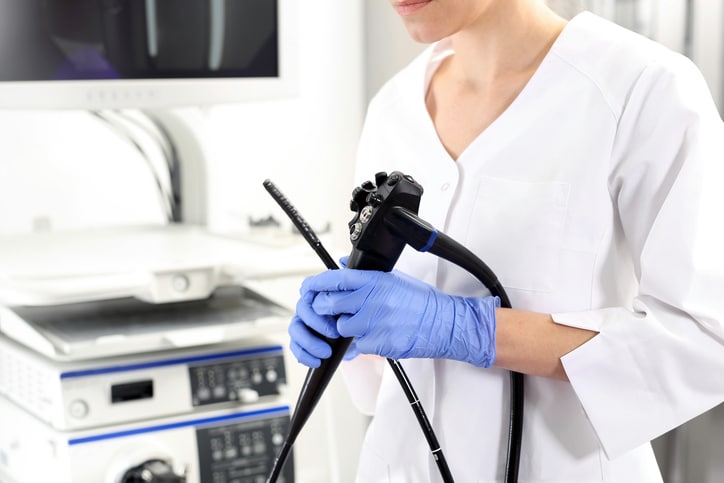The colonoscopy may be the most-hated medical screening.
The prep is miserable. You have to fast the day before. And you have to take a laxative. This means hours of stomach cramping…and multiple emergency trips to the bathroom.
And the procedure itself is no picnic, either. It requires general anesthesia and a day of downtime. There is a risk of bowel perforation. This is rare, but it can be life-threatening.1
Doctors generally recommend that everybody get a colonoscopy at age 50, then every five to 10 years after that.2
But patients often ignore this advice because they dread the procedure. One survey found when doctors tell their patients to get the test, only 38% do it.3
Now, a new Harvard study shows you can stop having colonoscopies after you hit your 70s.4
Recommended for You: Common Herb DESTROYS Cancer
Fox News reports that this herb is “…shown to effectively destroy prostate cancer cells.” And researcher Dr. Jeremy Johnson confirms that a compound found in the plant shows “promising results” for not only prostate and skin cancer, but also breast, leukemia, and colon.
If you want this extract, you can buy it in any health food store. But chances are, you’ve already got the herb in your spice rack. Or perhaps growing on your windowsill. It’s that common. Click HERE for more details.
The Harvard School of Public Health reviewed the records of more than 1.3 million Medicare patients aged 70 to 79.
For people 70-74 years old, the test was found to reduce colon cancer risk only very slightly, from 3% to 2%. For those 75-79, the screening had zero effect on risk.5
The study was published recently in the Annals of Internal Medicine.
For some people over age 75, a colonoscopy might still be necessary. This includes those with have a family history of colon cancer or who have had precancerous polyps.6
Previous research has shown that colonoscopies do make sense for people between the ages of 50 and 70. A 2013 Harvard study found they cut the risk of colon cancer by 40%.7
3 Colonoscopy Alternatives
If you hate colonoscopies but are still too young to stop being screened, you should know about noninvasive alternatives that have become available in recent years.
These tests have accuracy rates similar to colonoscopy. They don’t require any uncomfortable prep. In fact, you can do them at home.
Their main disadvantage is that they do not allow doctors to remove precancerous polyps, which is possible during a colonoscopy. If you test positive with one of these screenings, you’ll likely be scheduled for a colonoscopy.8,9
Fecal immunochemical test or FIT. This test looks for blood in the stool. It can be ordered by your doctor and is approved by the FDA. It costs about $20.
Stool DNA test. It’s another at-home stool test ordered by your doctor. The test looks for abnormal DNA that may indicate cancer.
Cologuard test. Similar to the DNA test, this new test uses DNA technology to find elevated levels of both abnormal cells and damaged hemoglobin in the stool. It is more expensive, costing about $600. But it is more sensitive than other at-home tests. And unlike the other screenings, it needs to be done only every three years instead of every year. Many insurance plans cover it.
Why is it important to get screened? Because colon cancer is third most common cancer in both men and women. About 50,000 Americans die from it every year. But if it is caught early, the cure rate is more than 90%.10,11
Dr. Deborah Fisher is an associate professor of medicine at Duke University. She says, “When it comes to colorectal cancer, the best test is the one you actually use.”12
There’s something else you should know about cancer… A small group of holistic doctors were quietly discovering cancer breakthroughs. Then, when word of their effective therapies started getting out, something terrible started happening… The doctors started disappearing.
Get all the details HERE.
In Good Health,

Angela Salerno
Executive Director, INH Health Watch
Like this Article? Forward this article here or Share on Facebook.
References:
1https://consumer.healthday.com/cancer-information-5/colonoscopy-news-140/colonoscopy-after-75-may-not-study-715217.html
2http://www.choosingwisely.org/patient-resources/colonoscopy/
3http://www.healthline.com/health-news/dreading-colonoscopy-other-effective-tests-for-colon-cancer-032015
4http://annals.org/aim/article/2556139/effectiveness-screening-colonoscopy-prevent-colorectal-cancer-among-medicare-beneficiaries-aged
5http://www.aspph.org/harvard-colonoscopy-benefits-after-age-75-questioned/
6http://www.mayoclinic.org/diseases-conditions/colon-cancer/expert-answers/colon-cancer-screening/faq-20057826
7http://www.cbsnews.com/news/regular-colonoscopies-may-cut-colorectal-cancer-risk-by-40-percent/
8http://www.healthline.com/health-news/dreading-colonoscopy-other-effective-tests-for-colon-cancer-032015
9http://www.cologuardtest.com/what-is-cologuard/how-cologuard-works
10http://www.cancer.org/cancer/colonandrectumcancer/detailedguide/colorectal-cancer-survival-rates
11http://www.cancer.org/cancer/colonandrectumcancer/detailedguide/colorectal-cancer-key-statistics
12http://www.healthline.com/health-news/dreading-colonoscopy-other-effective-tests-for-colon-cancer-032015

